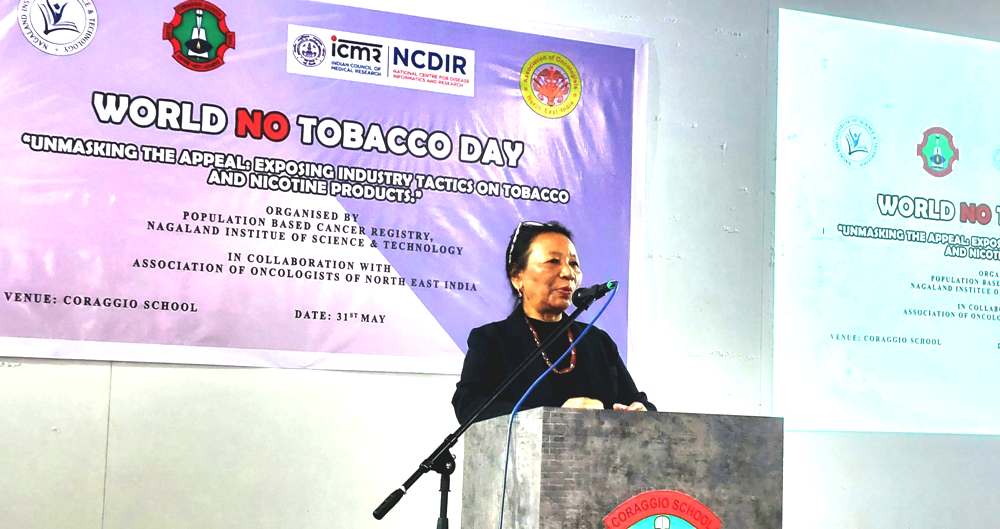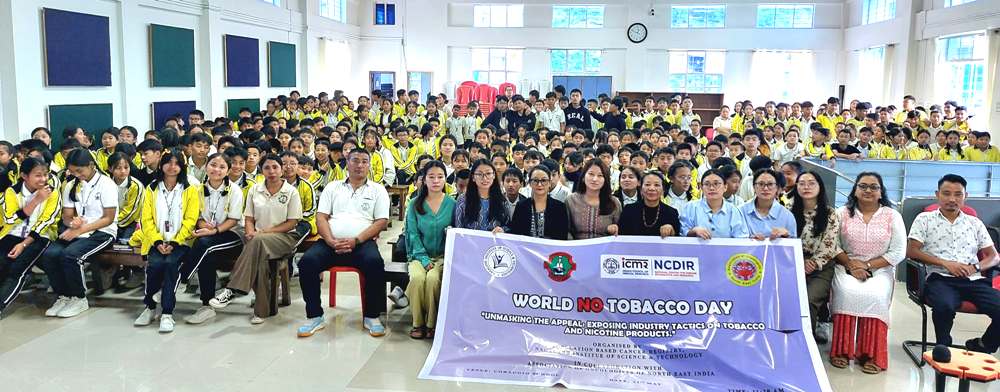SATURDAY, OCTOBER 11, 2025
- Home
- Tobacco driving cancer surge in Nagaland, warns NIST investigator
Tobacco driving cancer surge in Nagaland, warns NIST investigator
On World No Tobacco Day, Dr. V Khamo, Principal Investigator of the Population-Based Cancer Registry has raised serious concerns about the rising incidence of cancer in Nagaland
Share
- 12 to 13 lakh Indians die annually from tobacco use, with 3,500 deaths every day

Dr. V Khamo addressing students during the World No Tobacco Day event at Coraggio School, Kohima. (EM Images)
- KOHIMA — Dr. V Khamo, Principal Investigator of the Population-Based Cancer Registry at Nagaland Institute of Science and Technology (NIST), —attributing it primarily to widespread tobacco consumption.
- Speaking at the World No Tobacco Day event held at Coraggio School in Kohima, organised by the Population-Based Cancer Registry in collaboration with the Association of Oncologists of Northeast India (AONEI), Khamo described tobacco as a major health threat, warning students that it leads to cancer, heart disease, stroke, and other life-threatening conditions.
- Referring to the registry team at NIST as "cancer warriors," she explained: “We collect data from hospitals, homes, prayer houses—even cemeteries—to understand what types of cancer are prevalent in our state and why.”
- She shared that cancer cases have risen sharply in Nagaland, with tobacco being a key contributing factor. “Tobacco is bad for your health. Treatment is not only expensive but also largely unavailable in the state. Many patients must travel outside Nagaland, draining financial and emotional resources,” she said.
- Urging students to avoid tobacco in all forms, Khamo said: “You may see tobacco in shops looking like snacks or candy—but say ‘No’. It’s a nuisance that destroys lives.” She added that today’s youth are fortunate to receive early education on tobacco risks, something that was lacking in previous generations.

Dr. V Khamo, Dr. Vetsolu Hiese Koza, Kekhriengunuo Khamo, Annie Konthoujam, and others with students at Coraggio School, Kohima, on Saturday. (EM Images)
- The doctor called on students to be changemakers, asserting that they are capable of distinguishing right from wrong and should take a firm stand against tobacco.
- Hidden dangers: From toothpaste to vapes
- Adding to the warnings, Dr. Vetsolu Hiese Koza, Research Scientist at the Hospital-Based Cancer Registry and a dental surgeon, issued a stark warning about the growing health risks associated with tobacco use—particularly among the youth. This year’s World No Tobacco Day theme—“Unmasking the Appeal: Exposing Industry Tactics on Tobacco and Nicotine Products”—is particularly relevant, she said.
- Koza warned that even unconventional uses, such as applying tobacco as toothpaste, are severely harmful. “Tobacco comes from the Nicotiana plant, and its addictive property—nicotine—makes quitting incredibly difficult,” she said.
- Sharing alarming statistics, she revealed that 12 to 13 lakh Indians die annually from tobacco use, with 3,500 deaths every day. “India has the highest number of oral cancer cases in the world,” she stated.
- Tobacco products, Koza said, fall into four categories: smoking, smokeless, heated tobacco, and nicotine-only products. She maintained that both active and passive smoking are harmful, and so are smokeless products like chewing tobacco and snuff. “Some even rub tobacco directly on their teeth, which erodes enamel and causes permanent damage,” she added.
- She warned of the growing trend of vaping among youth, often misunderstood as safe. “Vaping delivers not just nicotine, but other chemicals that can become toxic when heated,” she cautioned.
- The doctor also raised concerns over areca nut (supari) consumption, a Group-1 carcinogen responsible for oral cancers. Listing harmful substances found in tobacco—arsenic, ammonia, cadmium, benzene, and even radioactive polonium—she asked students to think twice before using products that contain chemicals also found in rat poison and hair dyes.
- Beyond cancer, she said tobacco contributes to stroke, blindness, gum infections, heart and lung disease, reduced brain function, and self-esteem issues.
- Tobacco use also negatively impacts mental health by increasing stress and depression levels.
- She encouraged students and educators to actively discourage tobacco use and emphasised the importance of quitting. “It’s the single most important step for your health,” she said, suggesting therapy and counselling for those trying to quit.
- Legal framework and misleading advertising
- Koza also touched on the legal framework under the Cigarettes and Other Tobacco Products Act (COTPA), 2003. She cited the strict prohibition of tobacco sales to minors and within 100 yards of educational institutions under Sections 6A and 6B.
- Section 7 mandates health warnings on packaging, but Koza criticised how tobacco companies obscure these warnings through misleading designs. She also called out the glamorisation of tobacco in advertisements, especially those promoting pan masala through attractive celebrities.
- Koza urged everyone to be vigilant and resist deceptive industry tactics. She also administered a pledge to students and staff for a tobacco-free world.

